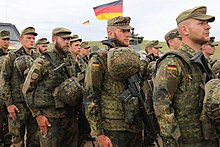Soldier
This article needs additional citations for verification. (August 2011) |
 German army soldiers at Vaziani Training Area, Georgia, 15 August 2018. | |
| Occupation | |
|---|---|
Occupation type | Profession |
Activity sectors | Military |
| Description | |
| Competencies | Physical Stamina Mindset |
Fields of employment | Armies Commando |


A soldier is one who fights as part of an Army. A soldier can be a conscripted or volunteer enlisted person, a non-commissioned officer, or an officer. Normally associated with an Army. Soldiers are military personnel that participate in ground, sea, or air forces.[1]
Etymology[]
The word soldier derives from the Middle English word soudeour, from Old French soudeer or soudeour, meaning mercenary, from soudee, meaning shilling's worth or wage, from sou or soud, shilling.[2] The word is also related to the Medieval Latin soldarius, meaning soldier (literally, "one having pay").[3] These words ultimately derive from the Late Latin word solidus, referring to an Ancient Roman coin used in the Byzantine Empire.[2][3]
Occupational designations[]
In most armies use of the word "soldier" has taken on a more general meaning due to the increasing specialization of military occupations that require different areas of knowledge and skill-sets. As a result, "soldiers" are referred to by names or ranks which reflect an individual's military occupation specialty arm, service, or branch of military employment, their type of unit, or operational employment or technical use such as: trooper, tanker (a member of tank crew), commando, dragoon, infantryman, guardian, artilleryman, paratrooper, grenadier, ranger, sniper, engineer, sapper, craftsman, signaller, medic, or a gunner.
In many countries soldiers serving in specific occupations are referred to by terms other than their occupational name. For example, military police personnel in the British Army are known as "red caps" because of the colour of their caps (and berets).
Infantry are sometimes called "grunts" (in the United States Army) or "squaddies" (in the British Army), while U.S. Army artillery crews, or "gunners," are sometimes referred to as "redlegs", from the service branch color for artillery.[citation needed] U.S. soldiers are often called "G.I.s" (short for the term "General Issue").
French Marine Infantry are called marsouins (French: porpoises) because of their amphibious role.[citation needed] Military units in most armies have nicknames of this type, arising either from items of distinctive uniform, some historical connotation or rivalry between branches or regiments.
Career and conscripted[]
Some soldiers, such as conscripts or draftees, serve a single limited term. Others choose to serve until retirement; then they receive a pension and other benefits. In the United States, military members can retire after 20 years.[4] In other countries, the term of service is 30 years, hence the term "30-year man".
Women[]

According to the United Nations, 10–30% of all soldiers worldwide are women.[5]
See also[]
- Airman
- Marine
- Sailor
- Military ranks
References[]
- ^ "soldier - Dictionary Definition". Vocabulary.com. Retrieved 19 July 2020.
- ^ Jump up to: a b Mish, Frederick C., ed. (2004). "soldier". Merriam-Webster's Collegiate Dictionary (11th ed.). Springfield, MA: Merriam-Webster. ISBN 0-87779-809-5.
- ^ Jump up to: a b Harper, Douglas (2010). "Online Etymology Dictionary". Retrieved 17 August 2010.
- ^ "20-Year Retirement". Armytimes.com. Retrieved 8 March 2012.
- ^ "#YouthStats: Armed Conflict". United Nations Office of Secretary General.
External links[]
| Wikiquote has quotations related to: Soldiers |
| Look up soldier in Wiktionary, the free dictionary. |
 Media related to Soldier at Wikimedia Commons
Media related to Soldier at Wikimedia Commons
- Soldiers
- Military specialisms
- Military life
- Combat occupations
